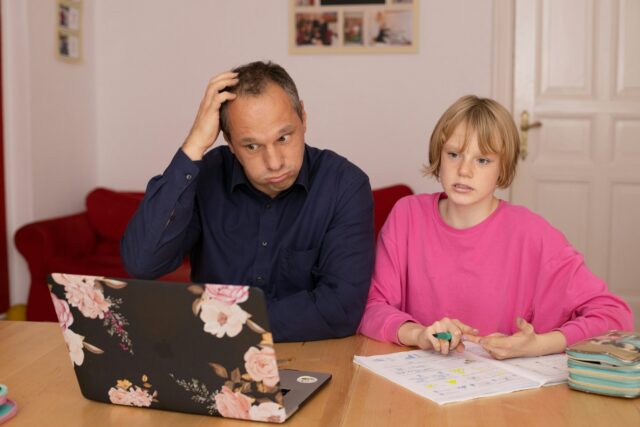Having an emotionally unavailable dad can leave you feeling confused, rejected, or even wondering if you’ve done something wrong.

The truth is, his distance likely has nothing to do with you at all. Emotional unavailability is usually rooted in his own life experiences, coping mechanisms, and unresolved issues. To help you better understand, here are a few possible reasons your father may be emotionally distant, and why it’s definitely not your fault. While you can’t change him or work through any issues he has that keeps him from connecting with you on a deep level, you could have a compassionate conversation with him that might encourage him to get some help.
1. He grew up in an emotionally repressed environment.

If your father was raised in a household where emotions weren’t expressed or valued, he might struggle to connect on a deeper level. Many men of earlier generations were taught that showing feelings was a sign of weakness, making it hard for them to be emotionally open as adults. That kind of upbringing creates a cycle where emotional distance feels normal. Understanding this can help you see that his behaviour is more about his past conditioning than his feelings about you. Breaking the cycle might not be easy for him, but recognising it can provide some clarity.
2. He doesn’t know how to process his own emotions.

Emotional unavailability often comes from a lack of emotional skills. If your father struggles to understand or articulate his feelings, he might avoid them altogether. That doesn’t mean he doesn’t care; it’s just that he doesn’t know where to start. Many people who bottle up emotions are afraid of opening the floodgates. While that doesn’t excuse his behaviour, it highlights the importance of compassion. He may need time and encouragement to work on his emotional intelligence.
3. He’s been conditioned to prioritise practicality over feelings.

Fathers are often expected to be the “problem-solvers” in the family, focusing on fixing things rather than engaging in emotional discussions. That practical mindset can unintentionally make him seem distant or unapproachable when emotions come into play. Again, he obviously cares about you because you’re his child. However, he might see emotional conversations as unproductive or uncomfortable. Understanding this dynamic can help you approach him in ways that feel more accessible to him, like starting with smaller, less intense discussions.
4. He’s carrying unresolved trauma.

Unaddressed trauma, whether from childhood, past relationships, or other life experiences, can create emotional walls. If your father has been hurt before, he may find it safer to keep his emotions locked away than to risk feeling vulnerable again. Trauma often shapes behaviour in ways people aren’t fully aware of, and it takes time and effort to unpack those experiences. His emotional distance might be his way of protecting himself, not a reflection of how he feels about you.
5. He feels overwhelmed by his responsibilities.

Being a parent comes with a lot of pressure, and some fathers respond by emotionally shutting down. If he’s juggling work, family, and financial responsibilities, he might feel too drained to connect emotionally, even if he wants to. While it doesn’t make the distance less painful, understanding the stress he’s under can help you approach him with empathy. Encouraging open communication about his struggles could help him feel less burdened and more present.
6. He struggles with mental health issues.

Conditions like depression, anxiety, or other mental health challenges can make it hard for someone to engage emotionally. If your father is battling his own inner demons, he might withdraw as a coping mechanism. While it’s not your job to “fix” him, recognising the role mental health might play can definitely change your perspective. Encouraging him to get support or professional help could be a positive step forward for both of you.
7. He was never taught how to express love openly.

Some fathers grew up in families where love was shown through actions rather than words or emotional closeness. If he was raised with the belief that providing for his family was enough, he might not realise that emotional connection is equally important. That doesn’t mean he doesn’t love you, it just means he might express it differently. Acknowledging these differences can help you see the ways he shows care, even if they don’t look the way you’d expect.
8. He’s afraid of being vulnerable.

Vulnerability requires courage, and not everyone feels comfortable opening themselves up emotionally. Your father might associate vulnerability with weakness, making him hesitant to let his guard down, even with those closest to him. The fear of vulnerability often comes from societal pressures or past experiences. Encouraging a safe and judgement-free space for conversations might help him feel more at ease with expressing himself, but understand that progress might be slow. Don’t rush or push him — give him time and space.
9. He feels like he’s already failed you.

If your father perceives himself as having let you down in the past, he might distance himself emotionally out of guilt or shame. That withdrawal is often his way of avoiding situations where those feelings might resurface. Reassuring him that relationships aren’t about perfection but connection can help ease his guilt. Small steps toward rebuilding trust and closeness can pave the way for a stronger bond over time.
10. He’s focused on providing rather than connecting.

For many fathers, being a good parent means being a good provider. The focus on material or financial support can sometimes overshadow the emotional aspects of parenting. He might believe that as long as your physical needs are met, he’s done his job. Helping him understand that emotional support is just as valuable can open new doors in your relationship. Simple reminders, like how much you appreciate spending quality time together, can encourage him to connect on a deeper level.
11. He’s unsure how to handle emotional situations.
 Source: Unsplash
Source: Unsplash When faced with emotional conversations, your father might freeze up or try to change the subject. He cares about what you’re saying, but he probably feels out of his depth or unsure how to respond appropriately. Approaching these moments with patience and understanding can help. Letting him know that it’s okay not to have all the answers might ease some of his anxiety around emotional discussions.
12. He’s influenced by generational expectations of masculinity.
 Source: Unsplash
Source: Unsplash For many men of older generations, emotional stoicism was often equated with strength. Your father might have been raised to believe that showing emotions, especially vulnerability, went against traditional ideas of masculinity. While societal views are changing, these deeply ingrained beliefs can be hard to unlearn. Showing him that emotions are a sign of strength rather than weakness might gradually encourage him to open up more.
13. He doesn’t realise how much his emotional distance affects you.

Sometimes, emotionally unavailable fathers simply don’t realise the impact their behaviour has on their children. He might assume that keeping his emotions to himself is protecting you, or that his distance isn’t noticeable. Gently expressing how his emotional unavailability affects you can be a powerful step toward change. It’s not about blaming him but helping him understand the importance of connection and how it strengthens relationships.




